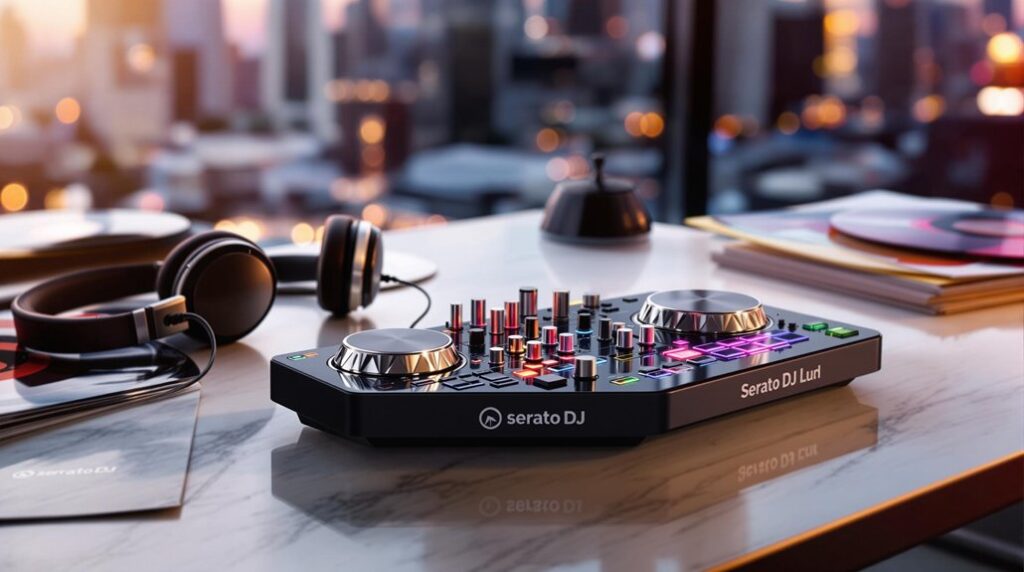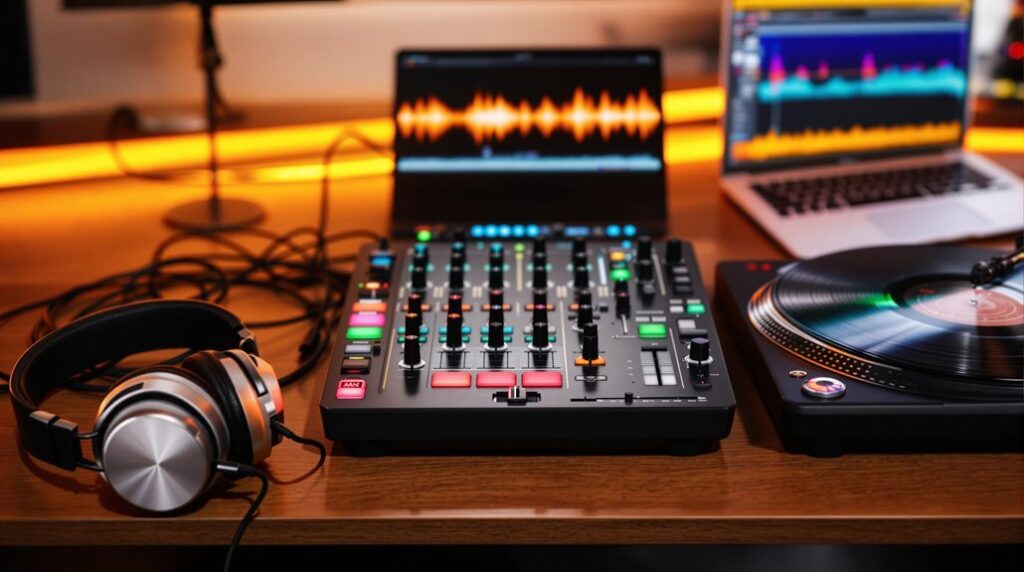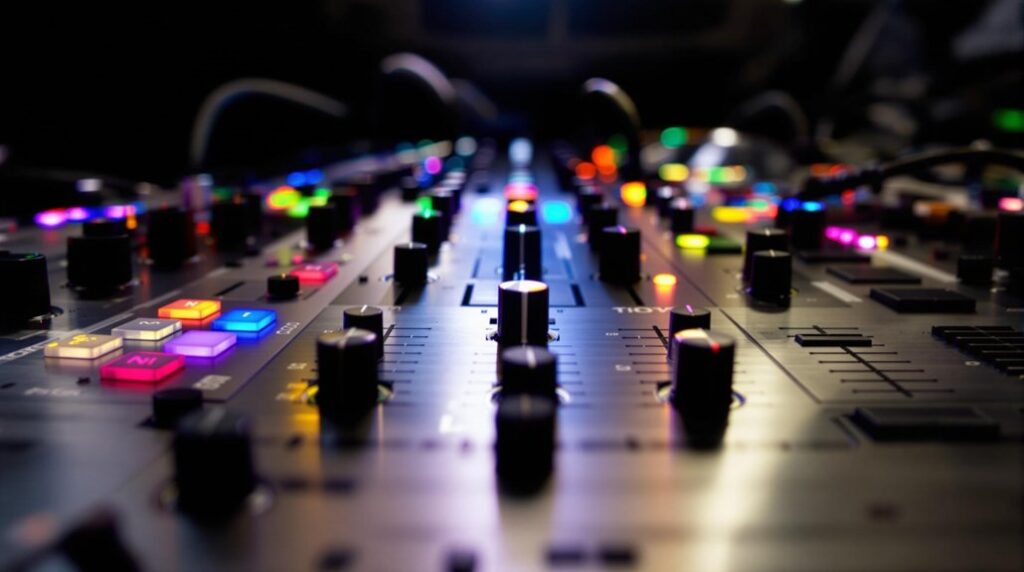When selecting a DJ deck, focus on features such as responsive jog wheels for precise control and high-quality pitch controls to maintain tempo integrity. Pay attention to versatile connectivity options like USB, MIDI, and RCA outputs for seamless integration. Opt for durable construction materials and reliable brands, ensuring longevity and consistent performance. Consider the deck’s software compatibility, which enhances mixing capabilities. Those interested in expanding their knowledge further can explore in-depth details provided beyond this overview.
Key Takeaways
- Look for responsive jog wheels with adjustable tension for precise playback control.
- Choose decks with high-quality pitch controls and a pitch lock feature for seamless beatmatching.
- Ensure multiple connectivity options like USB, MIDI, and RCA outputs for versatile integration.
- Opt for durable construction materials like metal and high-quality plastic for longevity.
- Verify software compatibility with Serato, Traktor, or rekordbox for enhanced mixing capabilities.
Key Features of DJ Decks
When evaluating DJ decks, a pivotal consideration is the responsiveness of the jog wheel, which is essential for precise control over track playback and scratching. High-performance decks incorporate a variety of connectivity options such as USB, MIDI, and RCA outputs, guaranteeing seamless integration with mixers and audio equipment. An advanced audio interface is indispensable, delivering high-resolution sound with minimal latency. Built-in effects, loop controls, and hot cue buttons are integral features that afford DJs creative versatility and fluid shifts. Portability is a key factor, particularly for mobile DJs seeking lightweight models, while heavier decks provide enhanced stability and durability, ideal for club environments. Thorough evaluation of these features guarantees a deck meets professional performance standards and enhances the DJ’s artistic expression. Controllers like the Denon DJ Prime 4+ offer standalone systems with touchscreens and built-in WiFi, providing DJs with modern streaming capabilities and smooth performance.
Importance of Jog Wheels
While evaluating the key features of DJ decks, the jog wheel stands out as a fundamental component in the realm of DJ performance. Essential for precise track playback, jog wheels facilitate intricate techniques such as scratching and beatmatching.
The size and responsiveness of jog wheels directly impact performance, where larger, high-quality options provide superior tactile feedback. Touch-sensitive variants enhance versatility, enabling seamless shifts between pitch bending and cueing. Adjustable tension settings allow DJs to customize the feel, tailoring it to their unique mixing style.
Additionally, LED lights integrated into jog wheels offer vital visual feedback, aiding in track alignment and enhancing the performance experience. Although indirectly linked, effective jog wheels can complement volume control, ensuring a cohesive auditory output. A high-resolution jog wheel can provide precise playback and scratching control, which is crucial for any beginner looking to master DJ techniques.
Reliable Pitch Controls
How essential are reliable pitch controls in the arsenal of a professional DJ? In the realm of DJ performance, reliable pitch controls are vital for maintaining tempo integrity and executing flawless beatmatching. High-quality pitch faders, typically offering ranges of +/- 8%, 16%, or 50%, allow DJs to fine-tune tracks according to their preferred mixing style. The incorporation of a pitch lock feature is significant, preserving the original key while altering pitch, thereby avoiding discordant changes. Advanced deck setups with digital displays offer visual feedback on tempo and pitch percentage, empowering DJs with precise control. Consistent and responsive pitch controls are indispensable, ensuring smooth shifts and enabling a cohesive mix, ultimately enhancing the auditory experience of any professional DJ set. Mastering fundamental mixing techniques such as beat matching and tempo control can significantly improve the quality of a DJ’s performance, ensuring seamless transitions and maintaining energy on the dance floor.
Format Compatibility
Format compatibility stands as a cornerstone in the selection of DJ decks, determining the breadth and flexibility of a DJ’s set. A thorough understanding of music formats such as MP3, WAV, AIFF, or FLAC is crucial for peak playback quality. Modern DJ controllers and CDJs often provide robust support for USB drives, streamlining access to extensive digital music libraries without necessitating a laptop. For purists, compatibility with vinyl records remains paramount, necessitating turntables specifically engineered for this purpose. Decks that integrate seamlessly with software like Serato, Traktor, or rekordbox can greatly expand digital music file capabilities, enhancing mixing options. Additionally, the ability to interface with various media sources, including CDs and streaming services, guarantees a versatile and adaptive performance environment. Incorporating advanced track analysis, as seen in Rekordbox, ensures precise beat matching and contributes to enhanced live remixing capabilities.
Durability and Build Quality
The backbone of any reliable DJ deck is its durability and build quality, which are pivotal for withstanding the rigors of live performances and frequent transport.
Constructed with robust materials such as metal and high-quality plastic, these decks are engineered for longevity. Key components like reinforced jog wheels and sturdy faders are essential, as they endure significant wear and tear, impacting mixing precision.
Professional-grade decks, such as those from Pioneer DJ, often feature replaceable parts, extending their functional lifespan. Additionally, rubberized feet and vibration-minimizing designs enhance stability and sound fidelity.
Brands like Pioneer DJ and Denon are renowned for their commitment to durability, offering equipment backed by warranties that underscore their confidence in superior build quality.
DJ controllers, with features like 4-channel control and touch-sensitive jog wheels, further enhance user experience and mixing flexibility.
Ergonomics and Layout
When evaluating DJ decks, considering the ergonomics and layout is vital for optimizing performance during extensive sessions. A DJ controller with a well-engineered layout considerably minimizes fatigue, allowing for intuitive control over essential controls such as EQ knobs, faders, and transport buttons. This design guarantees seamless adjustments without the need for excessive body repositioning, consequently enhancing efficiency during mixing sessions. Comfortable hand movements are facilitated by appropriately sized and placed jog wheels, fundamental for effective scratching and beatmatching. Adjustable height and angle options further customize the setup, aligning with individual working styles for maximized comfort. Additionally, a compact layout supports smooth changes between functions, thereby sustaining audience engagement without interruption, a key factor in maintaining dynamic performances. It’s essential to select equipment that suits your personal objectives and DJing style, ensuring that your gear enhances your performance rather than hinders it.
Enhancing Performance With DJ Decks
Elevating DJ performance hinges on the strategic selection and utilization of advanced DJ decks equipped with cutting-edge features. Key elements include:
- Responsive Jog Wheels: Adjustability allows precise track manipulation, vital for seamless shifts, bolstering overall performance.
- Sound Quality: High-grade sound cards provide accurate audio output, essential for monitoring mixes and preserving sound fidelity during live performances.
- Versatile Media Support: DJ decks should accommodate various formats, such as USB drives and SD cards, enhancing access to a diverse music library, and consequently expanding creative possibilities.
Additionally, features like beat sync and quantize functions automate tempo alignment, letting DJs concentrate on audience engagement.
Investing in robust build quality reduces the risk of technical failures, ensuring a professional and uninterrupted set. A notable trend in 2024 DJ controllers is stem separation technology, which allows precise beat matching for live sets.
Selecting the Right DJ Deck for Your Needs
How does one navigate the myriad of choices when selecting the ideal DJ deck tailored to specific needs?
The discerning selector must evaluate the type of music, such as electronic, to guarantee the DJ deck’s functionalities align with genre-specific mixing requirements. A built-in sound card is essential, facilitating straightforward integration with computers, thereby eliminating superfluous hardware.
Inputs and outputs must accommodate versatile performance setups, interfacing effortlessly with mixers, headphones, and speakers. The jog wheel’s size and responsiveness are critical for precise mixing and scratching, enabling seamless shifts.
Software compatibility with Serato or Traktor is paramount, revealing advanced features that enhance the mixing experience. Keeping firmware current helps avoid performance glitches and maximizes controller efficiency.
This meticulous approach guarantees the chosen DJ deck improves both functionality and creativity in any professional setting.
Frequently Asked Questions
What to Look for in a DJ Deck?
Evaluating DJ deck features involves analyzing sound quality, portability options, and build materials. Connectivity types, software compatibility, control layout, and effects integration are essential. Consider power requirements and price range for a thorough understanding of ideal performance and functionality.
What DJ Equipment Do I Need?
When considering DJ gear basics, essential accessories include quality headphones and monitor speakers. Sound quality importance and mixing techniques overview are paramount. Best software options and budget-friendly choices vary, as do portable setups, high-end features, and maintenance tips for performance venues.
What Are Good DJ Decks for Beginners?
For beginners, evaluating DJ decks involves considering budget options and essential features. Brand recommendations like Pioneer and Numark offer user-friendly designs. Reviews comparison and online resources aid skill development, while community feedback provides setup guidance and beginner tips.
What DJ Decks Do DJS Use?
Professional DJs employ various DJ deck types, including CDJs by popular brands like Pioneer, and turntable setups for vinyl mixing techniques. Digital vs analog preferences influence choices, with controller features enhancing performance. Mobile DJing options prioritize portability and DJ software integration.
Conclusion
In evaluating DJ decks, professionals prioritize key features such as the precision of jog wheels and the reliability of pitch controls, ensuring seamless beatmatching and scratch performance. Format compatibility and robust build quality are essential for versatile, long-lasting equipment. Ergonomics and intuitive layout further enhance usability, optimizing workflow during live sets. Ultimately, selecting the right deck involves aligning these technical specifications with individual performance needs, empowering DJs to nâng cao their artistry and technical prowess in dynamic environments.




